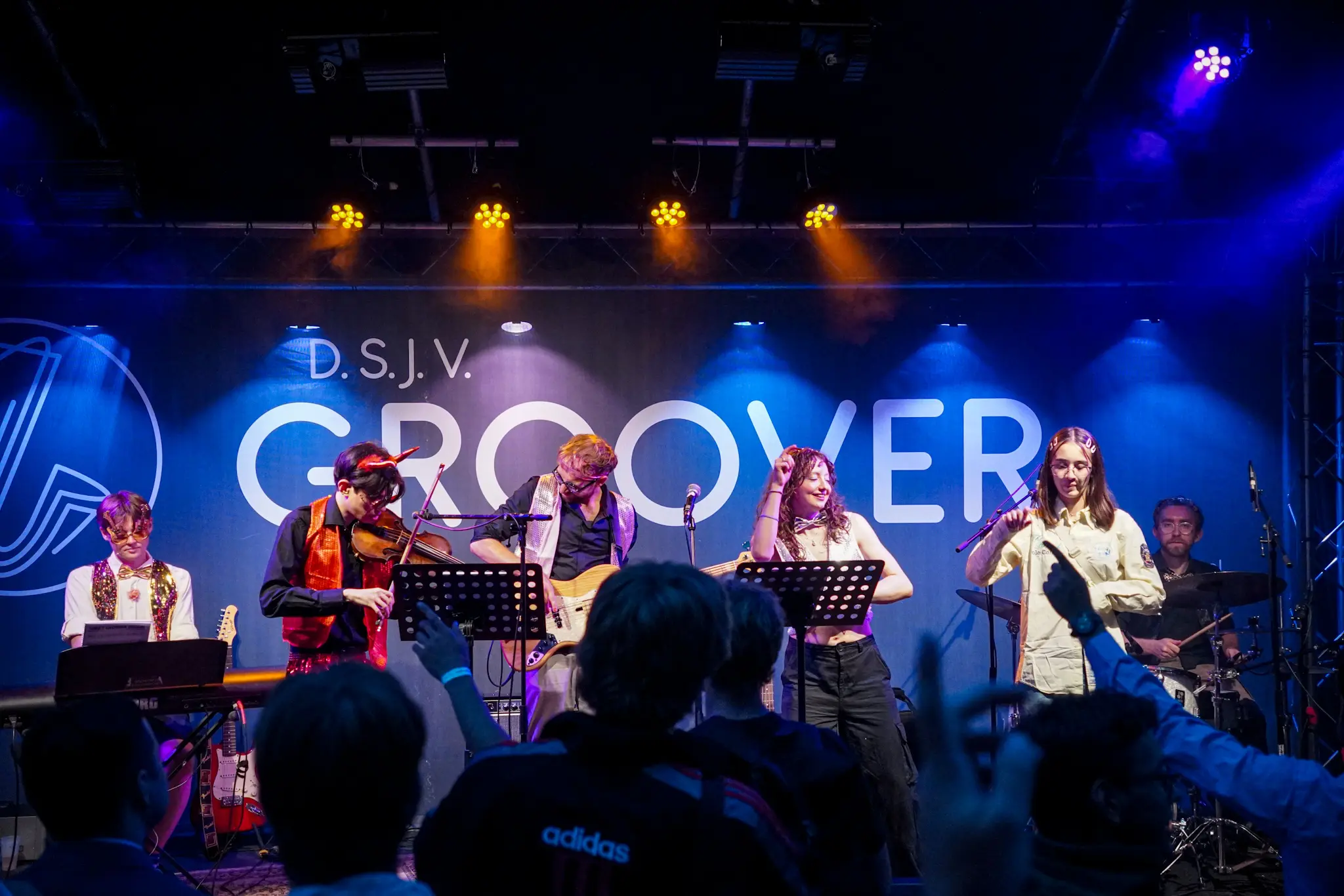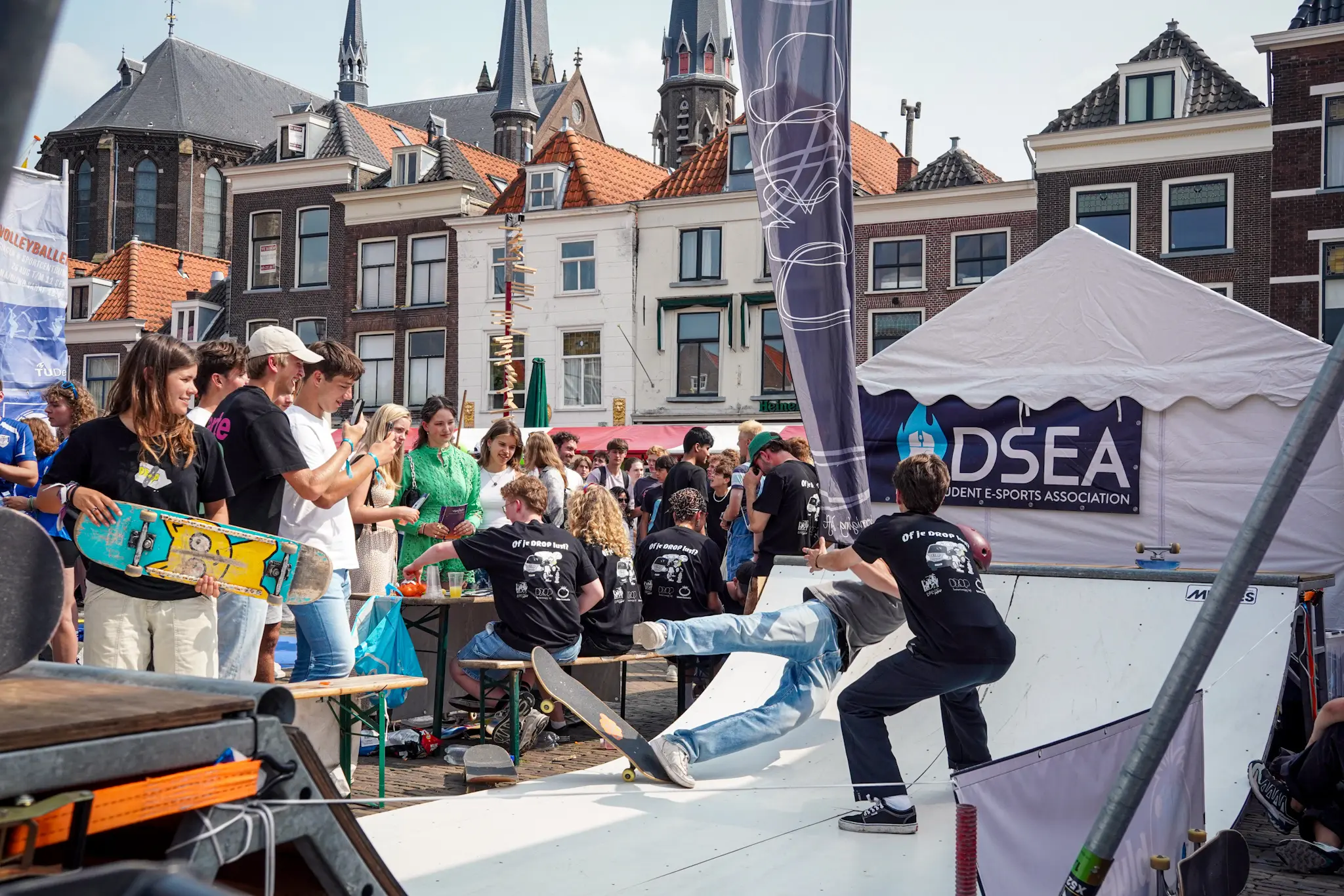While life for students and everyone else is getting more expensive, the remuneration for association board members remains the same in the Profiling Fund Scheme. Sports and cultural associations consider the remuneration too low. This must change, they say.
The 2024 information market. (Photo: Thijs van Reeuwijk)
Every current and former TU Delft student knows that TU Delft has more to offer than just lectures and quiet spaces. There are more than 90 sports, cultural, study and social clubs for the necessary ‘development’, as they themselves call it. TU Delft stands behind the importance of these associations and supports them with buildings and objects, as well as through financial remuneration (board months) for the students who sit on the boards and committees. It was because of this that the Profiling Fund Scheme was created years ago. It gives students on boards EUR 310 and those on committees EUR 155 a month for their work.
Extra requirements
For the sports and cultural associations, this is somewhat different says the Sports & Cultural Student Associations Board (SCVR). Timo Warmenhoven, the Chair, believes that it should be possible for all students to be part of a committee or board and that TU Delft should encourage this. But the current Profiling Fund Scheme is making this difficult, especially for sports and cultural associations, he says.
“While only the number of members are assessed for social and study associations, sports and cultural associations have to meet all sorts of additional requirements,” says Warmenhoven. In practice, he believes that this means that board and committee members are not sufficiently compensated. “And that while the amounts at other associations are already too low.”
‘Even TU Delft calls it sharing the scarcity’
Jointly with the Student Council, the Association Council (VeRa) and a few sports and cultural associations, the SCVR distributed a questionnaire among the administrators of associations. Warmenhoven was shocked by the answers. “Hardly any of the administrators of sports and cultural associations were fully compensated for the delay in study that they incurred by taking on their work. In most cases this was even less than 60%.” Delta saw the outcomes and the SCVR also shared them with TU Delft.

There is also a strong feeling of dissatisfaction about the level of the compensation in the Student Council. “Not only sports and cultural associations, but we also hear from other student associations that the Profiling Fund Scheme is not adequate. Even TU Delft calls it sharing the scarcity,” says Jelle Stap, Chair of the ORAS student council party.
Voluntary work
The support is needed as most student associations could not exist without the voluntary work of their members. Lisa, who was on the board of the SoSalsa dance association, agrees. As she struggled with her mental health during her board year, she prefers her surname not to be used.
‘By being responsible for all these tasks, I learned a lot’
Lisa emphasises that sports and cultural associations like SoSalsa play an important role in many students’ lives. “Our members do not become members just to dance, but also to make friends and build a social life. It is a warm and hospitable environment where people can be themselves in different ways.”
Without board members like Lisa, SoSalsa would not exist. Furthermore, she also got a lot out of her board year, she says. “I went to meetings, I led committees and organised activities such as dance lessons and performances. By being responsible for all these tasks, I learned a lot.”
Appreciation
But the low financial remuneration can have severe consequences for administrators, as appeared from Lisa’s story. She felt a lot of pressure to continue studying as much as possible. Lisa had a lot of difficulty doing everything. “At the beginning of my board year, I really had no idea how to keep juggling so many balls,” she says.
The combination of the pressure during the exam period and her continuous board work even led to a burnout. “I did not know how to deal with the stress. Luckily I managed to climb out of it with the help of a psychologist.”
Not only the study stress creates problems for administrators. The SCVR says that they also receive little appreciation from TU Delft. “It is often not even about the money in itself, but about the feeling that TU Delft attaches no value to the associations and the people who work for them,” says Warmenhoven.
‘It feels as though there is no recognition that we are doing something good for TU Delft’
Lisa agrees. “It feels as though there is no recognition that we are doing something good for TU Delft. And that while we are supporting the well-being of many students.” The students say that another thing that does not help is that having to request board months takes a lot of time and effort. “The process takes a lot of time and contact with TU Delft is not easy. You have no idea where you stand,” says Lisa.
Revision of the regulation?
TU Delft is currently working on revising the Profiling Fund Scheme, but it is not clear to what extent the Scheme will be revised. The Student Council is discussing this with the Executive Board and the Council says that the prognosis is an increase of between 10% and 15%.
ORAS says that this is not enough by far. “The payments have not been increased over the last 10 years. Add the long-term study fine to this, which will probably make it even less attractive to join activities outside your study,” says Stap. The Student Council thus argues for an RPF (Profiling Fund Regulations) budget increase that is on a par with inflation. Since the last increase, this will mean an increase of over 30%.
In a letter, the SCVR calls on the Executive Board to take action. Warmenhoven sums up the message, saying “It really is necessary that the total number of months of compensation for sports and cultural associations is increased so that the delayed studies that administrators incur are fully compensated.” He does note a related issue. “This must not come at the cost of the funds for social and study associations, or for unforeseen circumstances.”
‘Fabulous year’
While ORAS Chair Stap agrees with Warmenhoven that the sports and cultural associations should get more board months, he does not think this will happen. “We are in discussion with TU Delft about a new way of dividing up the pot of money, but it does not look like the total number of months will go up.”
Lisa hopes that her successors do receive a higher remuneration, but whatever happens, she advises everyone to follow her lead. “Do not have any doubts if you get the chance to be on a board or committee. I had a fabulous year and have made five new best friends.”
TU Delft’s response and the next steps

Delta sent a list of 10 questions to a TU Delft spokesperson about the current Profiling Fund Scheme and its revision. He was unable to respond fully before the summer holidays. However, he did send this statement.
‘We know about the issue concerning the Profiling Fund Scheme and are giving it our full attention. A consultation meeting will be held with the Student Council about it. The SCVR’s input, just as all other input, will be assessed. We do not carry out these discussions through the media. At the moment, nothing can be said about the outcome.’
The RPF and the pending revision has been the subject of discussion at several consultation meetings between the Student Council and the Executive Board over the last academic year. The regulation is on the agenda of the last meeting of the current Student Council on 28 August.
The regulation is subject to a major review every three years, including this year. The revision should have been ready in April 2024, but this did not work out. The reason why is not clear to the Student Council, says Maud Reinders (ORAS), the spokesperson. She assumes that any changes will be ready before the months for this academic year are assigned. This will, as usual, be done in November.



Comments are closed.